We’re not great in the Church at telling people our good news stories. It’s a bit odd given that the Church exists for no other purpose than to proclaim the Good News of Christ. Whether it’s out of a sense of humility, or trepidation that past wrongs could come back to haunt us, Irish Catholics have been slow to take credit where it is due.
One area which has seen a transformation in the Church in Ireland is the whole area of safeguarding – ensuring that our Church is a safe place for children and vulnerable adults where they can experience the love of Christ.
The great untold story of the abuse crisis that has done so much damage is the heroic response that has marked efforts to restore credibility and ensure that justice is done.
There is a veritable army of volunteers – mostly laypeople – in every parish and Church organisation in the country who take specific responsibility for safeguarding. Many give freely of their time at weekends and the evenings to ensure that they are up to speed with training and emerging issues like social media.
The policies and procedures adopted by the Church here can truly be said to be the gold standard in terms of child protection. Experts in safeguarding often now use the robust Church standards as the yardstick in helping sporting groups and other voluntary organisations adopt policies. It was hard won, and before Church leaders take too much of a bow, it has to be acknowledged that it came after a lot of resistance.
Policies, of course, are only as good as those implementing them. That’s where supervision comes in. The Church here is subject to periodic review by the independent National Board for Safeguarding Children in the Catholic Church.
This week saw the publication of a review into how child safeguarding is being handled in the Diocese of Kilmore. It’s a pilot review that will now be rolled out across the entire Church. While acknowledging past wrongs and missed opportunities to tackle abuse in the past, the report overall makes for gratifying reading. Bishop Leo O’Reilly should be proud of what he and those around him have achieved in the field of child protection.
The report notes that “the reviewers experienced a very open approach from Bishop O’Reilly and his team, reflective of their obvious commitment to ensuring that Kilmore Diocese has a focus on best practice in relation to safeguarding children.”
Those who work in safeguarding in the diocese spoke about the strength of support they receive from Dr O’Reilly. One person who made an allegation of abuse was interviewed as part of the review and according to the report “expressed genuine satisfaction and gratitude for the compassionate support that they had received from Bishop O’Reilly and from his DLP [designated liaison person]”.
Across the Church, any priest or religious facing an allegation is immediately stood down pending enquiries. Guidelines underline the fact that the law of the land is absolutely paramount and every single allegation is now immediately shared with the civil authorities. Canon law plays no role whatsoever until such time as either a prosecution is secured or authorities decide not to proceed. Even when civil authorities don’t proceed, a Church trial – which requires a much lower burden of proof – will often find an accused priest guilty and dismiss him from the priesthood. No cleric who is judged by competent professionals to be a threat to children is allowed to remain in ministry.
There has been a revolution in attitudes. In short, when the Church was arguably most in need of reform in Ireland, laypeople stepped up to the plate, took their co-responsibility for the Church with bishops and priests seriously and helped transform a corrupt culture. That is good news, and it’s good news that needs to be shared.


 Michael Kelly
Michael Kelly
